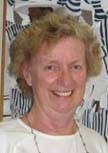You Can Do It - Avoid Avoiding
 |
About the presenter: Judith Eckardt is a licensed certified speech-language pathologist who specializes in fluency. She is a Board Recognized Fluency Specialist in ASHA and resides in Tucson After graduating from the University of Wisconsin in 1964, she worked in the public schools in Illinois and maintained a private practice. Emphasis was on fluency therapy, consultation, and presenting workshops and in 2002, began doing this work in stuttering in AZ. Beginning in 1999 to 2004, she was a clinical supervisor at Eastern Washington University in July for the Successful Stuttering Management Program. Judith was Convention Chair for the AZ Speech and Hearing Association (ArSHA) in May, 2006. Much time has been donated to the self-help movement for people who stutter. She is a stutterer and founded NSA Metro North in the Chicago area and in June 2000, was Chair of the 17th Annual Convention in Chicago. Judith received the award of SPEECH-LANGUAGE PATHOLOGIST OF THE YEAR in 2001 from the NSA. In Tucson, Judith is co-facilitating the NSA Chapter and in May, 2007, traveled to Croatia for the International Stuttering Association Meeting and Congress. She completed her six year term as ISA Secretary but will remain on the ISA Advisory Board To continue working on her own speech, Judith is a Toastmaster at Fountain Flyers in Tucson and is working on her ATM Award. |
YOU CAN DO IT - AVOID AVOIDING
by Judith Eckardt
from Arizona, USA
"You can do it"
"Follow your dreams"
"But I stutter!"
As a teenager, everybody who stutters has these thoughts. How can you cope with these thoughts, especially "But I stutter"? So, what can you do?
First of all, you must realize that it is NOT your fault that you stutter. It is just something that happens----just like some people have black hair and are short and some people have red hair and are tall (that was me, red hair, 5'8" tall, 100 pounds at age 14). Stuttering is only a big deal to you. Your peers often look past it. That happened to me in 8th grade. I was elected Student Council Secretary and I stuttered.
Nobody seemed to care that I stuttered but reading the minutes each week was a "slow death" for me. I was into major avoidance behaviors at that time which included situations, sounds, and words. I could hide my stuttering fairly well but at times used "weird words". As Secretary in reading the minutes, I could not avoid the situation or substitute words. I had to read the minutes as I had written them and guess what? I survived. I didn't die from stuttering and even felt GOOD when I was done.
That was the beginning of a big change in my thinking about stuttering and in obtaining fluency. Yes, I knew the stuttering controls such as "light contact" from therapy in school but it didn't seem to help my speech. It just didn't work for me in tough speaking situations. However, the longer I read those Student Council minutes week after week for the entire 8th grade, the more fluent I became. Why? I was slowly eliminating avoidance behaviors such as word switching and I no longer worked so hard to hide my stuttering. I read those minutes weekly, stuttered, survived, and felt GOOD. Later with the help of speech therapy, I began to tell people that I stutter and began to use voluntary stuttering. To this day, I often introduce myself as "J-J-Judith" , use J-J-Judith on my voice mail and in my email address, and have had hundreds of pens printed which say my name as J-J-Judith E-E-Eckardt.
Yes, everybody knows that I STUTTER and I still do with having "good" days and "bad" days but I know I must AVOID AVOIDING. The bonus of this elimination of avoidance behaviors has been that my "speech controls" work better now and the overall result has been more fluency. My constant goal is to say "what I want, when I want, and where I want" with some stuttering and with effective communication skills. My communication skills have improved over the years by gradually entering more difficult speaking situations in my daily life and forcing myself to do public speaking. Yes, not only public speaking but sometimes, even public reading from a prepared script.
If I could do it at a Student Council Meeting at age 14 fifty years ago, I can do it now, survive, and feel GOOD.
So, I encourage you to FOLLOW YOUR DREAMS. Most important is to AVOID AVOIDING ! YOU CAN DO IT !
August 30, 2006

